
Breadcrumb navigation
Alumni Careers: "I think the training I had was absolutely second to none"
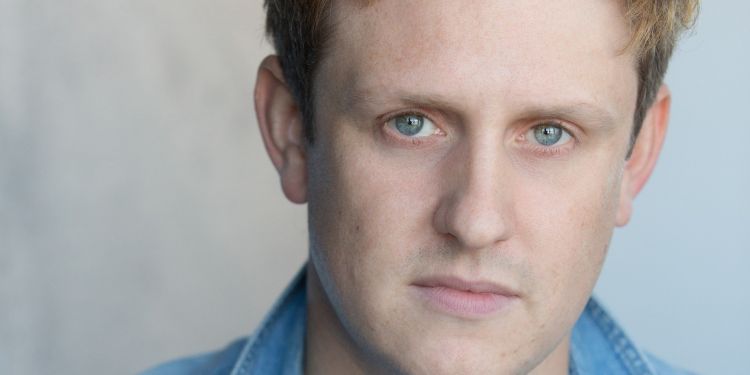
A conversation with alumnus Richard Goulding (Acting, 2007) on returning to Guildhall.
Richard Goulding studied Acting at Guildhall School after training and working as a school teacher. Since graduating in 2007, Richard has played various roles on both stage and screen including Prince Harry in Mike Bartlett's King Charles III and Channel 4's The Windsors. Now, Richard is returning to Guildhall to play AE Housman in our Vocal department's Songs at Six: AE Housman in songs and letters.
You're returning to the School to perform in a special Songs at Six concert on 15 November. Could you tell us a little bit about the event and why you wanted to get involved?
I’m very excited to be collaborating with Iain Burnside again. We first worked together in 2011 on a wonderful show about Ivor Gurney called A Soldier and a Maker based on Gurney’s songs, poems and letters. Iain created a brilliant, almost groundbreaking piece of theatre which was a true fusion of acting, singing and piano. In many ways a show that could only be made at Guildhall. This performance is smaller in its scale but similar in its vision and Iain has once again distilled a huge amount of material into a witty and touching script. I was born and brought up in Shropshire and studied classics at Oxford so there is a natural draw to Housman although, as it turns out, A Shropshire Lad is not autobiographical - he hardly stepped foot in Shropshire and I have a feeling he took his classical education to loftier heights than I!
It's been 17 years since you graduated, how does it feel to be coming back to the School? Has it changed much since you were last here?
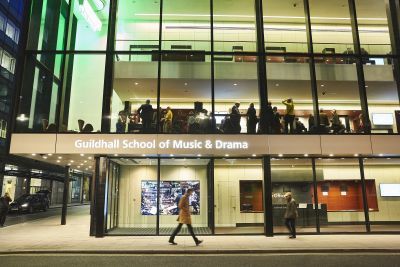
I’m delighted to come back to Guildhall to work with Iain and a new generation of singing students. After I graduated in 2007 I had a long association with the Drama department as a visiting director but haven't been back since 2019. The world has changed a lot in that time and no doubt the training reflects that - the obvious shift since I left is, of course, the building of Milton Court, which is mightily impressive and has catapulted the School into the modern world. I have to say, though, I miss the old days of the Drama corridor and its ramshackle, intimate atmosphere. I'm sure the sense of togetherness, collaboration and courage that characterised the place when I trained still persists though!
Why did you choose to study at Guildhall School?
I decided to apply to drama school when I was 23. I already had a degree and a career as a school teacher. It was a fairly major decision in my life and a risky one. But it did mean that I took it very seriously and knew that if I was going to train, it would only be at an absolutely top drama school and one that I definitely wanted to be at. In that sense it was a very active and specific decision. As soon as I walked into the audition at Guildhall I felt, deeply, that it was the right place. The audition panel were warm, open, friendly, demanding and genuinely interested in who I was and what I could offer, and in creating an atmosphere in which I could give my best. It felt like a place where human connection, truth and honesty mattered. I only applied to one other drama school where I had a very different experience. Luckily Guildhall liked me enough!
How would you describe the atmosphere and culture at Guildhall during your time there? What did it feel like to walk into the building?
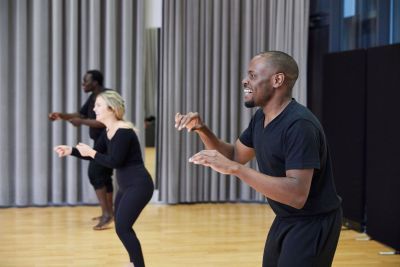
I’ve already mentioned the pre-Milton Court Drama corridor, which had a wonderful and unique atmosphere. Everyone was sort of on top of each other (not literally, but almost!), the staff offices were right next to the rehearsal rooms, everything was a bit old and beaten up; we all, students and teachers, felt involved in a common creative endeavour and seemed to share the same enthusiasm. We fed off each other’s energy. It was by no means a bed of roses but it was a rich experience.
The training was hard and uncompromising in many ways but it was very far from the reports of being ‘broken down’ that have emerged from other institutions. On the contrary, I found it a nourishing environment which helped you go through the difficult process of confronting yourself! It is an exposing thing to realise that the ‘instrument’ you are training to use is your voice, your body, your imagination. We were certainly put through our paces but I loved that.
It was inspiring walking through the Silk Street foyer (at any time of day) and hear orchestras, singers, jazz bands, all sorts of music, warming up, rehearsing, performing. It felt like a true and excellent creative hub.
Are there any specific memories or experiences of the School that had a lasting impact on you? And how did Guildhall prepare you for your career?
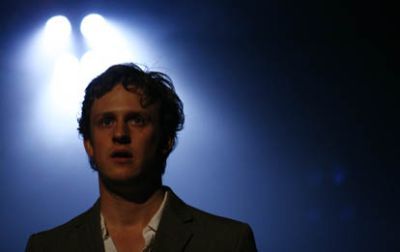
I think the training I had was absolutely second to none. I have lots of specific memories which have stayed with me and to which I still go back in moments of crisis or when I need reminding of what on earth I’m doing and why! There are too many to name here, really. Often it’s the bits of the training that seemed a bit mad at the time, that didn’t quite feel serious minded enough to me. Often I hear Ken Rea’s voice in my head saying: ‘Be more yellow!’.
I loved the Chekhov project in the first year. It was an extended rehearsal project over a whole term, most of which we spent improvising (a horror for me) and exploring character, situations, relationships, back stories. There are no hiding places and no quick fixes with that work - it was frustrating, maddening, enriching, challenging, exposing, ultimately completely joyful and I think it was the steepest learning curve I have ever had. I treasure the memory of our final run through on Hampstead Heath, which concluded with us each raising a toast to the project with a shot of vodka!
The Greek project in the second year was mind blowing for almost opposite reasons - just as challenging but this time two weeks of unbelievably intense emotional and vocal commitment to truth, simplicity and searing honesty. I suppose the common denominator of both those projects was the imperative of the ensemble; another reason I found the training at Guildhall so uniquely attractive. There is one moment that is etched on my memory, not only a defining moment of my training but which actually changed my outlook on the world; I was battling away in rehearsal very early on in the training and the director, stopped me and said: ‘You know, don’t you, that it’s not actually about you… it’s about them?’ In one moment he took all the pressure off trying to be ‘good’ and made it clear to me that acting is, fundamentally, a generous and joyous craft.
You've had the opportunity to portray a wide range of characters, including some high-profile living figures. Out of the diverse roles you've taken on, which one has been your favourite to bring to life, and what drew you to that particular role?
That’s very difficult to answer. I have played a lot of real people, some living, some dead. It is a very peculiar challenge and one which can be quite tricky. Not to mention divisive. And when you play someone particularly famous you are aware that anyone who sees it will have a view. You have to honour the person, regardless of what ends of whatever spectrum you and they might be on. As with any character you have to put yourself in their shoes. I was furious when I was cast as Boris Johnson in a film called Brexit: The Uncivil War (I thought I was too young, too thin, too handsome!) but I really did enjoy playing him. It’s important when playing a real person to tread the delicate line of evoking them without trying to be an impressionist while also engaging with what the script is demanding; staying true to their point of view while not sending them up too much.
When I left Guildhall I was sure that if I had any sort of career at all it would almost certainly be in classical theatre.. as it turns out, and to my surprise, I’ve spent a lot of my career to date working on new writing and television comedy. I’ve been very lucky to enjoy a wide range of work. I think the project I’m proudest of I’ve already mentioned - the Ivor Gurney project with Iain Burnside. The most fun I’ve had is undoubtedly playing Prince Harry in The Windsors. The scripts are unbeatably funny and the cast a complete joy. But I do still want my fill of Shakespeare.
What has been your career highlight since leaving Guildhall School?
As I say I’ve been extremely fortunate in my career so far to have worked in a broad range of projects in theatre, film, tv, radio. My imagination and ambitions were fired by theatre, classical plays - I always wanted to work at the National and the RSC. I’m lucky to have done that and I have a hunger for more. I want to play the ‘great roles’… while recognising, of course, that the moment is long past when it became clear to me that I will never play The Dane!
I did a play a few years ago called King Charles III. It was in 2014, long before the late Queen died, was labelled ‘a future history play’ and written in iambic pentameter - as such it was a conscious imitation of Shakespeare with clear echoes of some of his plays and characters. I played Prince Harry who was a kind of Romeo/Prince Hal/Hamlet figure. It started at The Almeida, transferred to the West End, then Broadway, we did it on the radio and finally we made a film. It was the complete journey, and it was incredible with a wonderful, brilliant company. But almost the best thing about it was that we had no idea of its potential success; we rehearsed it naively and honestly and allowed the play, which turned out to be provocative and brilliant, to speak. I think that is the show which has best reflected the way I want to approach my work.
What are your hopes for the future?
To keep working, to keep challenging myself, to stave of cynicism and to stay curious.
How has the industry evolved since you graduated, and how have you adapted to these changes?
The industry and the world have changed hugely over the last 20 years, most of it unquestionably for the better. I don’t really feel qualified to comment much; I tend to accept things as they are and try to go with the flow.. and then moan when things don’t go my way! I have, however, made a conscious effort not to engage with social media - almost certainly an extremely stupid, philistine thing to do but I want to try to preserve the last threads of my mental health if I can. I definitely don’t enjoy the world of self tapes: I still prefer a meeting with real humans. Apart from that it’s a question of hanging in there.
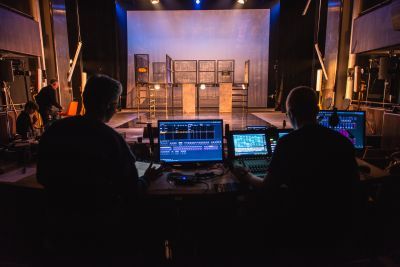
What would be your one message to the Class of 2024 who have just graduated?
Be brave, be honest, be kind, be curious.
Be like an oak tree (or any kind of tree for that matter): bend with the wind but stay true to your roots.
There’s an excellent poem called Ithaka by CP Cavafy which the late and wonderful Wyn Jones (who was Head of Acting when I was at Guildhall) loved and gave to us as we graduated. It is excellent advice for navigating your career and life. Read it.

